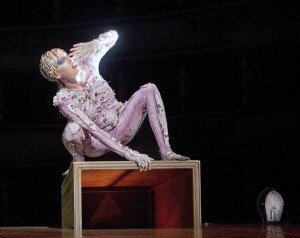The Tempest, Imagined and Real
Audrey Luna's Ariel
spirit and singer extraordinaire
Despite distant warnings about a hurricane coming our way, Tom and I went ahead with our plans to celebrate our 27th — yes, 27th! — wedding anniversary in New York City. One of the highlights of our trip was taking in a new production put on by the Metropolitan Opera, The Tempest, composed and conducted by Brit Thomas Adès.
What we experienced was a visual treat, with sets, special effects, and costumes that borrow cleverly from pop culture. To depict the tempest at sea, a large gold chandelier descends from the ceiling, inexorably spinning. Hanging upside-down, Ariel, clad in a skin-tight sparkly leotard, twines around the chandelier like an acrobat from Cirque du Soleil. Harry Potter-like effects appear in the form of moving portraits (depicting Prospero’s traitorous brother and henchmen) and video images effectively show the wilderness that the shipwrecked passengers must wander through. The costumes, designed by Kym Barrett, are some of the most luscious I have ever seen, and flatter even the heftiest sopranos and tenors of the chorus.
Thomas Adès score, however, borrows not one eighth note from pop culture. It is angular and dissonant, with propulsive, square rhythms and no particularly hummable melody. Still, the orchestration and vocal balance he achieves is always effective. Some of the singing, in particular colaratura Audrey Luna’s Ariel and mezzo Isabel Leonard’s Miranda, is astounding.
What drives the work forward to its satisfying conclusion is Adès and librettist Meredith Oakes’ understanding of Shakespeare’s final play. They elucidate the Bard’s themes portrayed in his complex protagonist Prospero: the oppressed becoming the oppressor, the destructive nature of revenge, the power of love to transform and unite, the ultimate power of forgiveness. Modern production values and videography aside, relying on good old Shakesperare to provide the framework for a new work that will last — it’s a smart bet.
The next day, we decided to forego our reservation at Becco, one of our favorite restaurants. This real-life tempest was really going to happen, it seemed. Three hours later, the city closed its trains and subways. Eight hours later, Hurricane Sandy wreaked havoc on New York and New Jersey, and us too, and unlike Shakespeare, we could conjure up no Ariel to clean up the mess.
But today, finally, the sun is shining. The storm of election battles is over. I wouldn’t mind singing about that.


